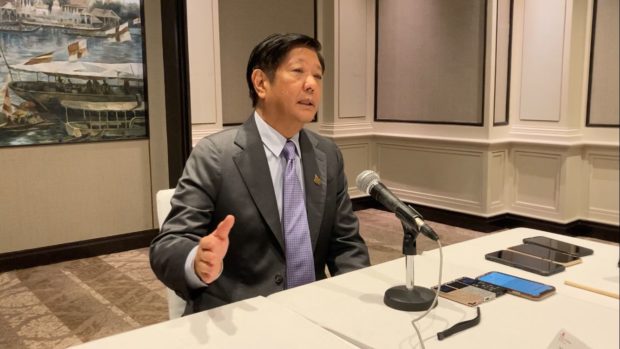
President Ferdinand Marcos Jr. answers questions from the media on the sidelines of the Asia-Pacific Economic Cooperation Summit in Bangkok, Thailand on Nov. 19, 2022. (File photo by DANIZA FERNANDEZ / INQUIRER.net)
MANILA, Philippines — President Ferdinand Marcos Jr. recently met with a council of advisers to who make up an advisory council of his administration to tap their support in the fight against smuggling, Presidential Communications Secretary Cheloy Velicaria-Garafil said on Saturday.
In a statement, Garafil said that Marcos met on Thursday with members of the Private Sector Advisory Council (PSAC) to discuss a range of issues, including “rampant smuggling” in the country, as Marcos described the problem.
According to the PSAC, among those in attendance were the council’s head, Aboitiz Group chief executive officer (CEO) Sabin Aboitiz; Bank of the Philippine Islands chief operating officer Ramon Jocson; Globe president and chief executive officer Ernest Cu; PLDT president and CEO Al Panlilio; and Union Bank of the Philippines chief technology and operations officer Henry Aguda.
‘Side deals’
Aguda heads the digital infrastructure group—one of several divisions in the council—whose members include Cu, Jocson and Panlilio.
Also at the meeting were Socioeconomic Planning Secretary Arsenio Balisacan, Information and Communications Technology Undersecretary David Almirol, and other government officials.
The inclusion of smuggling on their agenda marked the second time the President tackled that issue in less than a week. At Tuesday’s Cabinet meeting, Mr. Marcos noted that there were “so many smuggled onions” in the country and suggested their “release to the market” once they had passed phytosanitary inspection.On Thursday, he observed that there were “systems in place” against smuggling but “they are not working.”
“Whether the systems are ineffective or whether it’s the way they’re being operated or the result of side deals by the people, the end result is that the systems currently in place are not working …. The government cannot continue to sweep the issue under the rug because the cost to the state and private businesses is enormous,” Mr. Marcos said.
‘New agencies’
One recommendation made during the meeting was to open up the database of the Philippine Ports Authority to the Bureau of Customs and Department of Agriculture to ensure the coordinated use of information in monitoring smuggling activities.
The President also cited “issues [hampering the] ease of doing business” as well as “inefficiency in the country’s airports and seaports” as among the complaints raised by the business sector.
Quoting the President, Garafil said “concerned agencies have to be more innovative [and] the government has to delineate functions or establish new agencies if necessary to be effective.”
The government loses at least P250 billion in revenues a year due to smuggling, according to an estimate made last month by Jesus Arranza, chair of the Federation of Philippine Industries and head of the group’s antismuggling committee.
Smuggling has been a recurring economic issue in the country for decades, Arranza said, citing the illegal entry not only of agricultural products but also luxury goods like clothes, food, and even cars.